Introduction
In 2024, pyOpenSci’s vibrant community led efforts to make open source science more accessible, inclusive, and equitable for all. We empowered the broader community to create, contribute to, and discover better software through beginner-friendly training events, collaborative tutorials, and software peer review.
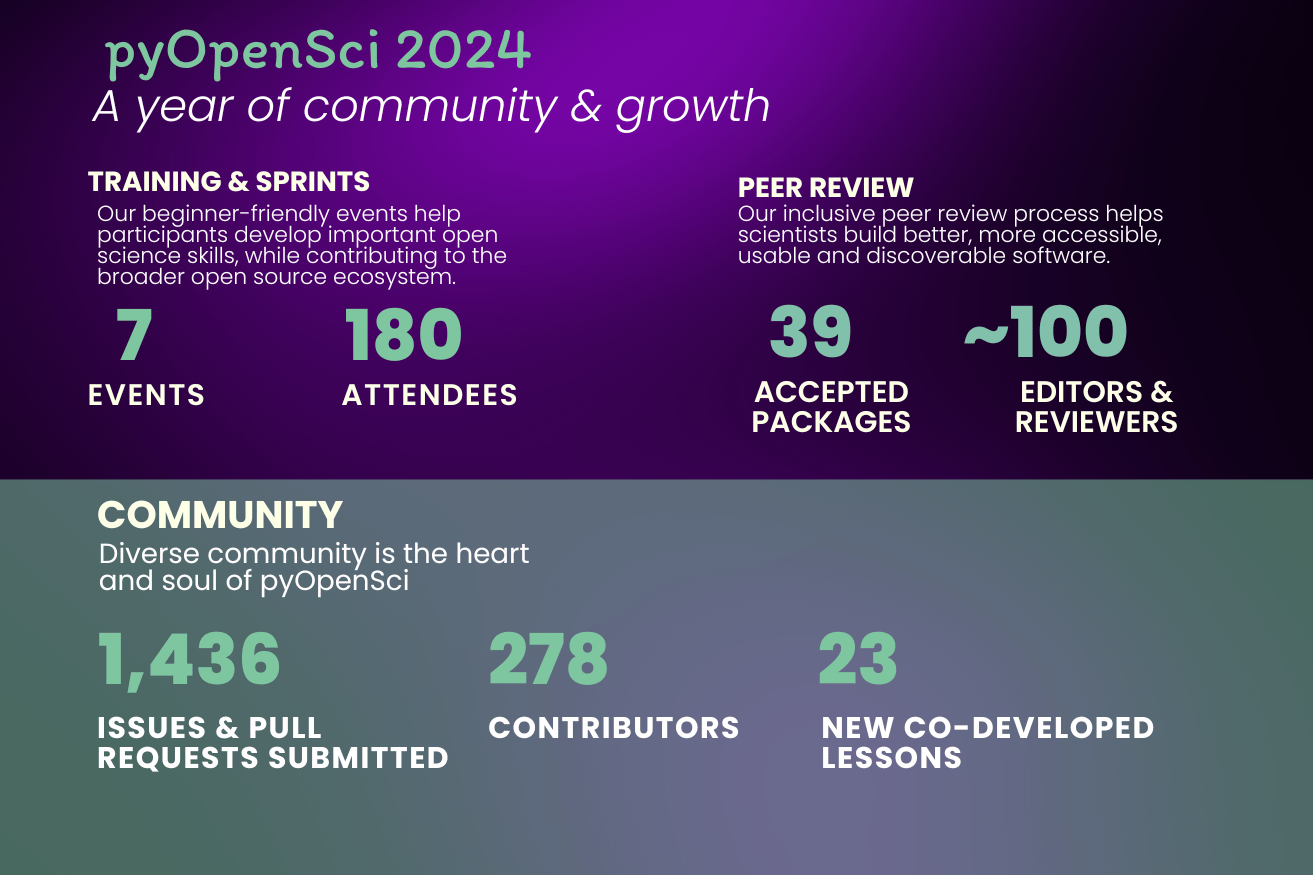
Looking back, I’m inspired and humbled by what we’ve achieved together:
- We co-created a Python package template aligned with our beginner-friendly Python packaging tutorials that we co-developed.
- We launched a new Training Initiative to empower open source newcomers and explore what sustainability means for pyOpenSci.
- We expanded our Software Peer Review Program, increasing its global impact.
- And our contributor community grew
As I reflect on an incredible year, I want to take a moment to celebrate these milestones and set the stage for an ambitious 2025. Here’s a look back at what we accomplished together in 2024 and where we’re heading next.
Co-creation of beginner-friendly content: Python packaging made easy(ier)
A defining strength of the pyOpenSci community is its commitment to co-creating accessible technical lessons for Pythonistas at all skill levels. These lessons, in turn, support our beginner-friendly tutorials and training events (more below). In 2024, this commitment shone through in creating our tutorial, “How to Create a Python Package”. This tutorial provides an opinionated way to create a Python package–a key step in making Python packaging more approachable and accessible for all.
Our packaging tutorial is the product of a vibrant collaboration between developers, scientists, and beginners. Packaging tool maintainers and packaging experts worked alongside those newer to packaging to co-develop, review, and refine content that is accurate, thorough, and welcoming to newcomers.
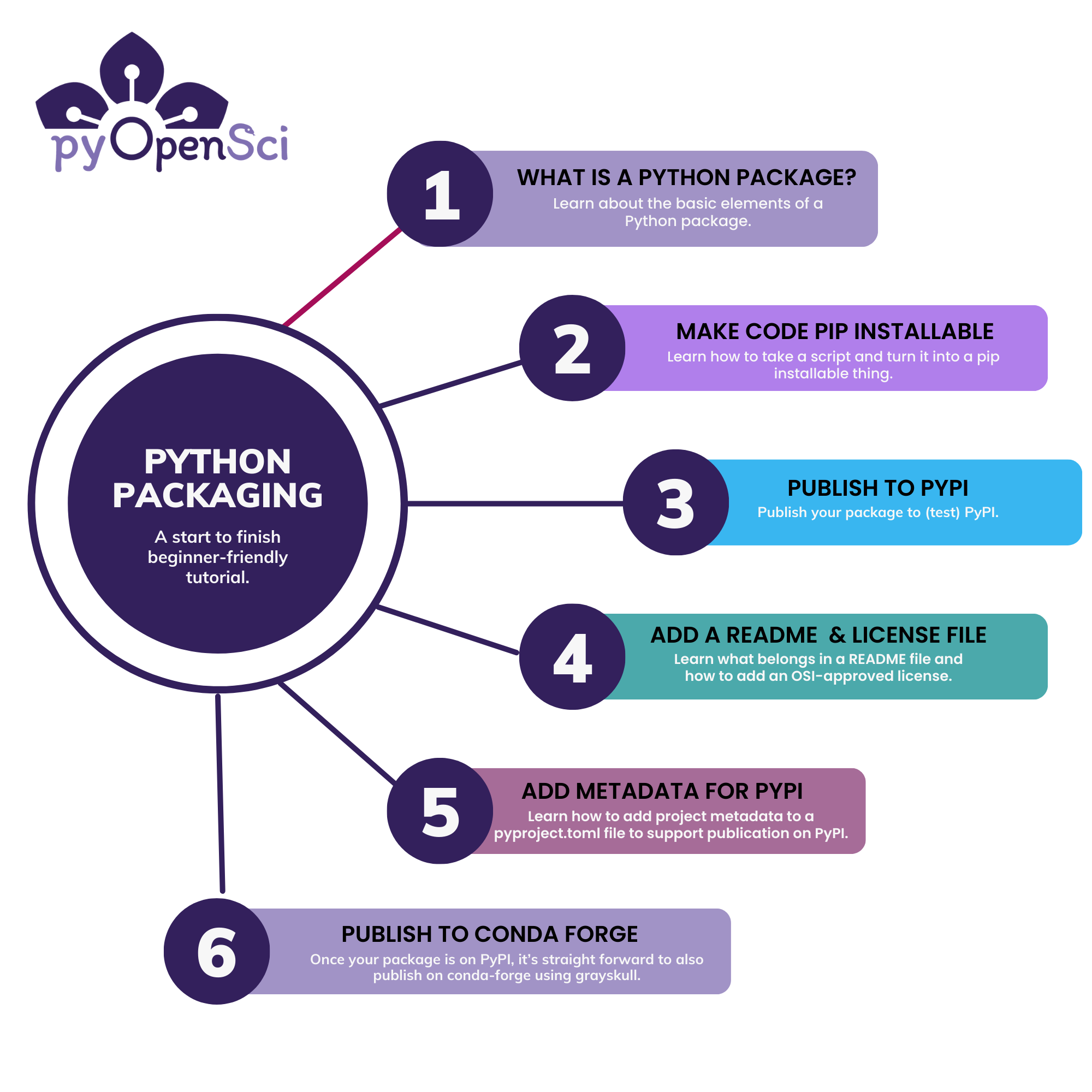
Collaborative learning in action: building together, learning together
Our co-development process brought contributors of all experience levels together to create a resource that:
- Blend expertise: Developers and scientists shared insights, while beginners shaped the content with fresh perspectives.
- Demystifies packaging: Clear, precise explanations, reviewed by experts and tested by newcomers, break down complex steps for new users.
- Describes core concepts visually: Custom graphics and step-by-step guides make technical concepts easier for visual learners to grasp.
We’re building both knowledge and community by publishing these lessons as free, open-access resources. This collaborative effort exemplifies the unique power of pyOpenSci to bridge expertise, foster learning, and strengthen the open source ecosystem.
Simplifying Python packaging: Our easy-to-use Python package template
To further simplify the process of creating a new Python package, the community also came together to develop an easy-to-use Python packaging template. The template allows you to create a skeleton Python package that follows our beginner-friendly Python package tutorial with just a few commands.
Many learners used this template successfully during our Fall Festival (more below!) and we look forward to refining it further in the upcoming months.
Give it a test-drive and let us know what you think!
pyOpenSci’s training new training initiative: empowering our global community
In 2024, we launched the pyOpenSci training initiative to lower barriers and make scientific software education more accessible to all.
To further our commitment to equity, we awarded 25+ scholarships to support participation from a diverse group of students, researchers, and contributors.
Event Highlights: Fall Festival
Our first-ever Fall Festival featured inspiring keynote speakers like Rowan Cockett, who introduced participants to MyST Markdown, Melissa Mendoça who discussed her personal pathway into open source from academia, and Eric Ma, who overviewed the importance of reproducibility in science.
On the event’s last day, George Stagg, developer of Quarto Live, and James Balamuta kicked off the day with an overview of how Quarto Live makes interactive publishing of dynamic scientific outputs easier, connecting scientific workflows with shared outputs.
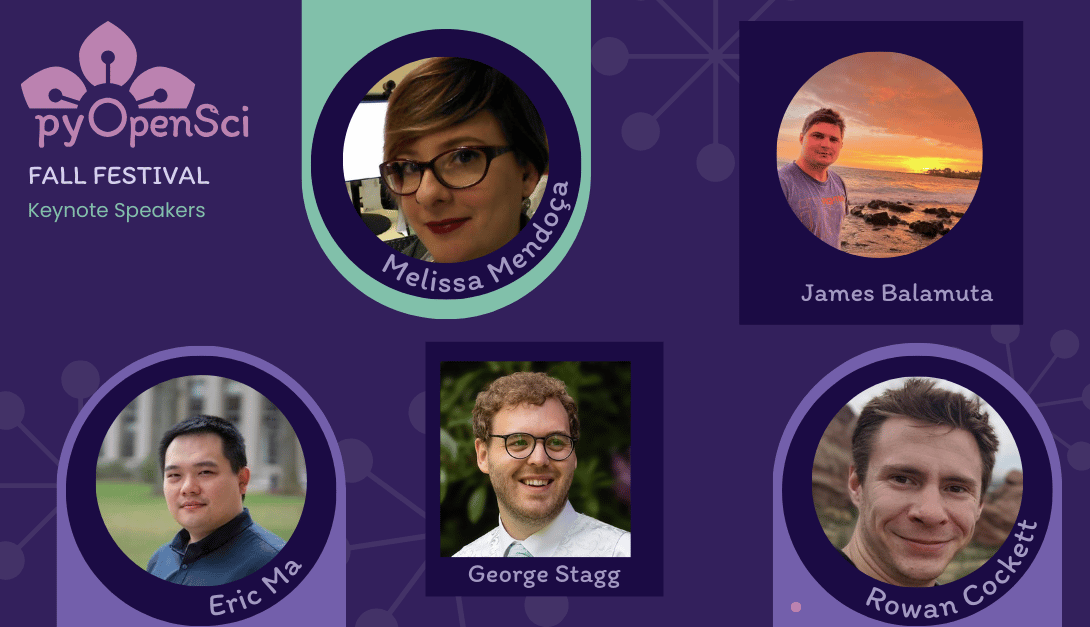
The dynamic spatial chat platform fostered real-time collaboration and made learning interactive, personalized, and fun!
I love the engagement…how people were attended to individually despite being in a group setting. I enjoyed that learning could happen in a personal and group setting.
Volunteer contributors who made it possible
The Fall Festival wouldn’t have been possible without the dedication of our incredible volunteers, who handled everything from workshop support to tech troubleshooting. Their efforts ensured a welcoming, smooth experience for participants.
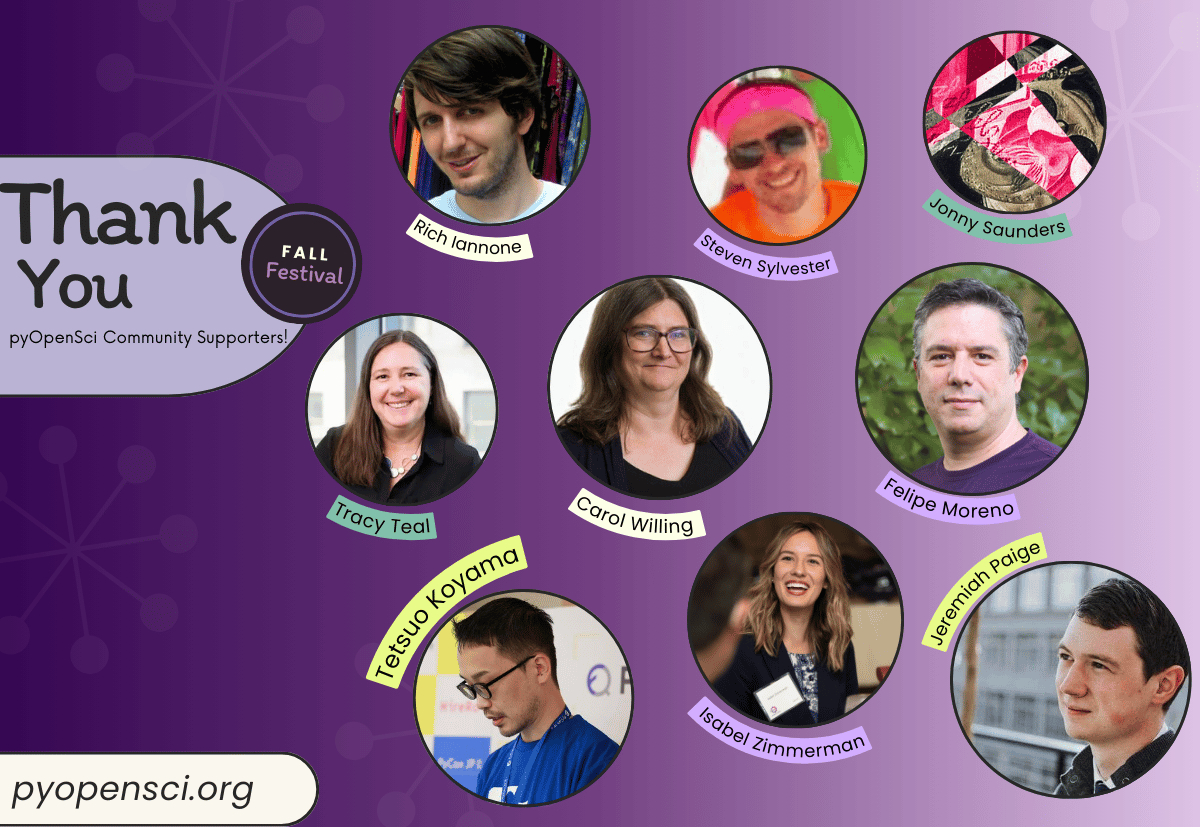
Open education lessons from the Fall Festival
Participants didn’t just learn—they contributed! Thanks to the collaborative energy, the event produced several lessons that are now freely available to the community:
- Writing Clean Code
- Optimizing Code for Better Workflows
- Running Code Efficiently
- Publishing and Sharing Code
These lessons reinforce key technical skills and showcase the power of community-driven learning and co-creation.
Event highlight: Intro to Python packaging workshops
As a part of our training initiative, we also ran two beginner-friendly packaging workshops where dozens of participants successfully created their first Python packages by following our beginner-friendly packaging tutorials.
What did you enjoy most about the workshop?
The content and the crew! The team was so kind, patient, and approachable. I appreciate the amount of support and reassurance given during this tutorial. The content of the tutorial was also spot on. Everything we covered felt relevant and useful, and gave me the confidence to feel capable of creating my own packages.
The success of our training materials underscores the demand for inclusive, high-quality open science resources; they also demonstrate the power of community collaboration.
Expanding our software peer review program in 2024
The pyOpenSci software peer review program empowers scientists to build and improve the tools they rely on to process and analyze data. In 2024, we expanded our ecosystem of reviewed scientific Python packages to 39, thanks to the dedication of our editorial and review teams.
We also tried out a new editor in chief rotation system to avoid too much time burden on any specific editor. Below are our fearless EiC’s for 2024.
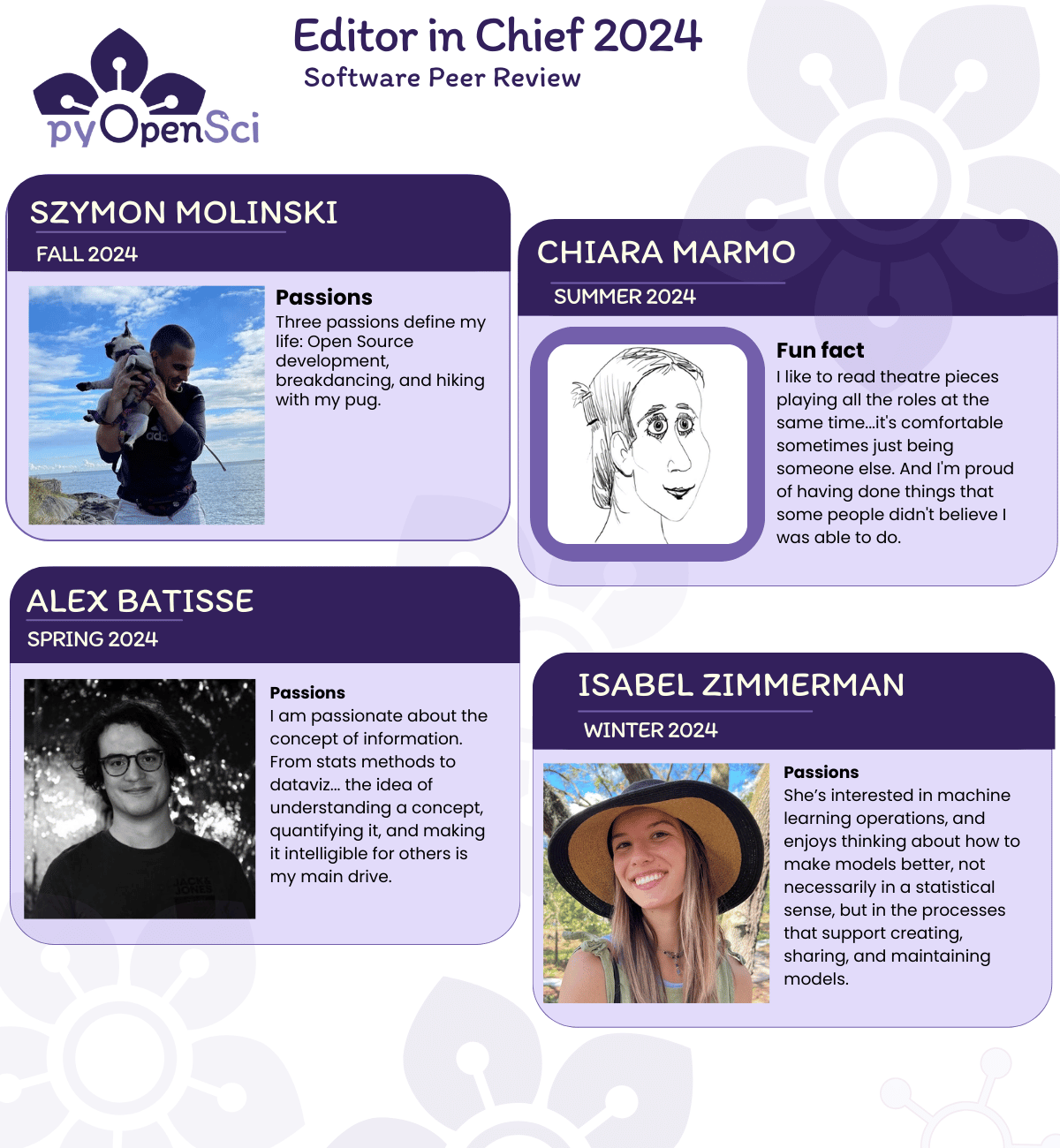
Our editorial team grew to 18 members, with a rotating Editor-in-Chief position, and was supported by 81 volunteer reviewers who contributed their time to ensure that every reviewed package in our ecosystem meets the highest standards for quality and usability.
In 2024, we received over 28 new submissions.
Peer review success in 2024
-
Publishing impact through partnerships: 21 packages of our accepted packages were published in JOSS through our peer review partnership.
-
Strengthening ecosystems through domain-specific affiliation: Astropy: Our domain-specific community partnership program accepted three packages for Astropy affiliation. Our partnership with Astropy and JOSS demonstrates how communities with some overlapping goals can truly work together effectively.
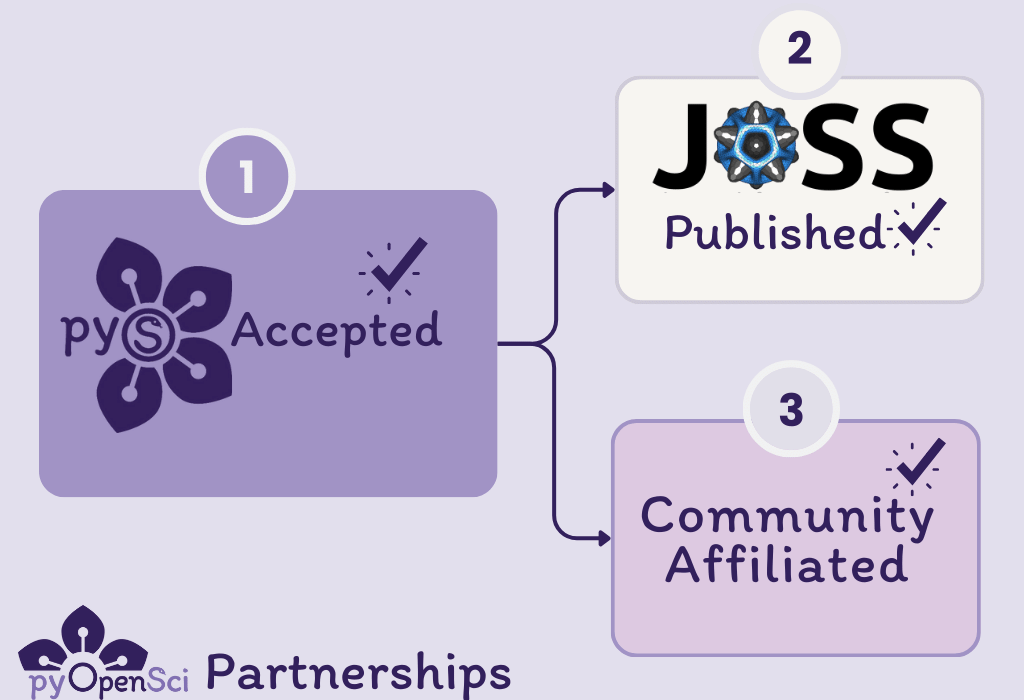
Navigating ethical challenges in generative AI
In 2024, we began to address the emerging challenge of reviewing packages that rely on proprietary generative AI models. We discussed important ethical questions about transparency vs. innovation in scientific software. Should we review packages that depend upon proprietary (closed box) models that are rapidly evolving?
More work is needed, and we are committed to handling these complexities as we always do–collaboratively and with great care.
A thriving, diverse contributor community: how contributions to pyOpenSci have skyrocketed
In 2024, pyOpenSci welcomed 278 contributors from diverse backgrounds, many making their first-ever open source contributions. By prioritizing mentorship, accessibility, and community-led learning, we helped first-time contributors gain the confidence and skills to shape the future of open source science.
This was also the first year where volunteer contributions outnumbered staff contributions—a testament to the power of community.
Wow!
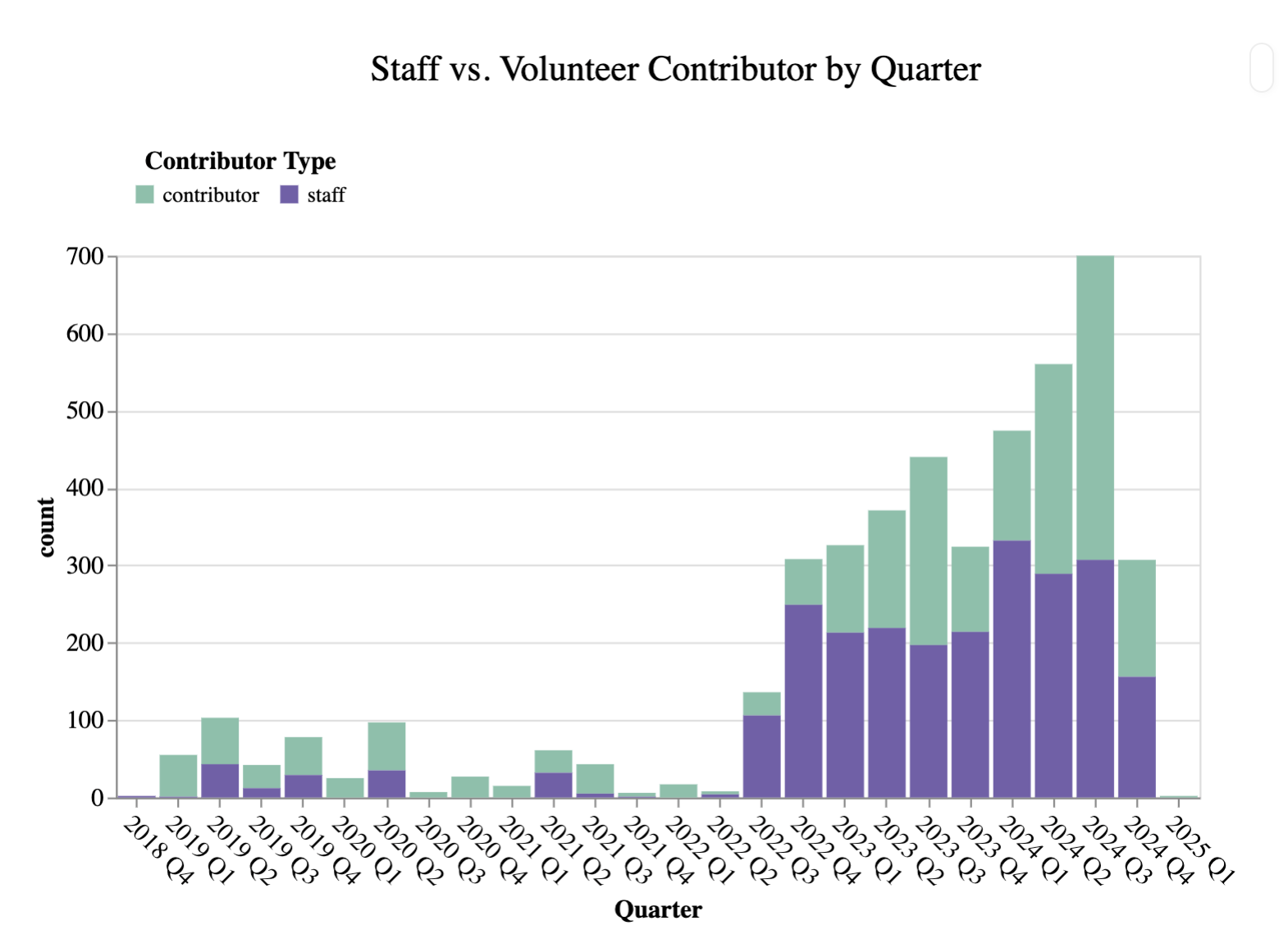
Empowering first-time contributors
A key driver of contributor and community growth was our beginner-friendly sprints. Sprint events exemplified the power of community support combined with mentorship & just a bit of training (mostly around git and GitHub). These sprints welcomed over 50 participants and resulted in 86 issues and pull requests—many from first-time contributors.
- PyCon US, SciPy, and PyCascades Sprints: Hosted across three major conferences, these events focused on hands-on mentorship, guiding participants through impactful contributions.
Amazing! Leah was so helpful as it was my first time doing anything like that. I had used GitHub for personal projects but never with other people so she was so good at teaching.
Our sprints strengthened our contributor community and sparked new initiatives, like translating our packaging guide into Spanish and Japanese.
Funding and sustainability
In 2024, we reached an important milestone in pyOpenSci’s journey. Our initial funding from the Sloan Foundation, which gave us our start as a fledgling project, ended in December. The Sloan Open Source Program’s generous support took us a long way—it helped me grow pyOpenSci from a part-time passion project into a thriving community dedicated to lowering barriers to open source scientific software.
We are deeply grateful for Sloan’s belief in our vision and commitment to open science. Last fall, we also received support from the Chan Zuckerberg Initiative (CZI), which will empower us as we move forward. This combined funding has enabled us to launch our training initiative, expand our peer review program, and co-develop beginner-friendly lessons and tutorials.
Building the future: new initiatives and funding efforts
As we look to the future, our current focus includes:
- Exploring funding models for pyOpenSci
- Growing our peer review partners and program
- Connecting with University OSPOS (Open Source Program Offices)
- A focus on empowering the community to contribute to open source
- Educational Videos that support our online content
Strong together: Why inclusion in open science matters now more than ever
At a time when access, equity, and sustainability in open science face challenges, we believe in building a space where everyone—regardless of background—can contribute, learn, and thrive. Diversity strengthens open source, and we are committed to ensuring that our community remains welcoming, supportive, and accessible.
Sustaining our impact
As we head into 2025, sustainability and our commitment to diversity, equity, inclusion and accessibility remains a top priority. We’re committed to growing pyOpenSci in ways that support our contributors, empower learners, and strengthen open source science. We’re actively seeking new partnerships, welcoming new contributors and funding opportunities to ensure our work continues to thrive.
To our funders, contributors, and community members—thank you. Your support makes our work possible and helps us build a future where scientific software is open, accessible, and collaborative.
As we reflect on where we’ve been and where we’re going, it’s important to acknowledge the teams that continue to guide our vision and growth. Our leadership teams—including the Executive Council, Advisory Council and Peer Review Editorial Board have been instrumental in carving the path forward for pyOpenSci.
We look forward to building the future of open science, one contribution at a time—and we invite you to join us on this journey.
Get involved with pyOpenSci
If you’d like to get involved with pyOpenSci, check out our volunteer page.
You can also:
- Keep an eye on our events page for upcoming training events.
Follow us on social platforms:
If you are on LinkedIn, check out and subscribe to our newsletter, too.

Leave a comment